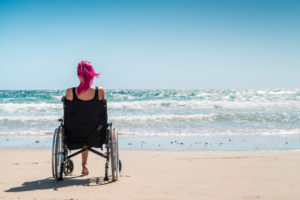27 Nov Psychological Stress After a Burn Injury

Psychological trauma is an unfortunate and common occurrence after a burn injury. Trauma suffered by burn injury survivors often lurks far beneath physical disfigurement. Insidious and unseen, the attendant social and psychological consequences can often be more damaging than the burn injury itself. Understanding what these symptoms are, and how they manifest themselves, can lead to successful treatment options.
Severe burn injuries are a major source of stress for everyone involved in the burn survivor’s life. Primary causes of stress include: pain and/or itching during the healing process, reliving the event and the circumstances that caused the burn injury, changes in appearance and the reaction of others to these changes, and worries about the future concerning all of these issues. Psychological stress affects all mind and body functions, and can trigger other medical complications.
There’s a litany of “normal” physical and emotional reactions to an “abnormal” event, such as a burn injury. Survivors commonly report feeling alone and isolated, insecure, afraid, distant and detached from others, but dependent upon them. Difficulty in sleeping, concentrating, and relaxing; both physically and mentally, is common. Survivors are often listless and seemingly disinterested in working towards recovery. Many preexisting variables, such as recent loss, or a prior trauma experience also impact a survivor’s stress level. Those who have experienced either of these factors before the burn injury are far more susceptible to debilitating long-term effects.
Loss, real and perceived, is the operative word in the post-injury life of a burn survivor. In fact, loss on a grand scale is the ugly, 500-pound gorilla in the recovery room because initially there is so much of it: loss of self- confidence, independence, appearance, even loss of livelihood, — often an utter and total loss of control, however temporary, in all of these areas. Elements unique to burn injury, such as bodily disfigurement, and the physical isolation often required for treatment, can wreak added havoc on both physical and emotional recovery.
The first step towards managing and ultimately overcoming stress caused by burn injuries is the hardest one: both accepting your injury and respecting the temporary boundaries it imposes on your normal life. Start by communicating with friends and family, and join a support group for burn injury survivors. Volunteering to help others in any area that interests you, is a good way to reconnect socially and renew your confidence. Maintain a healthy lifestyle with a well-balanced diet, regular exercise, and adequate sleep. Taking back your life by regaining gradual control of all of these elements, is an integral part of a healthy and lasting recovery.
Recovery happens at its own pace for every individual. But if your symptoms don’t diminish after a few months, or seem to intensify, ask for professional help. An experienced trauma specialist can suggest a variety of stress management techniques, coping strategies, and behavior therapies to help you.
There’s no such thing as a completely stress-free normal life for anyone, but there are a number of ways that burn survivors can dramatically lessen stress caused from burn injury, and find once again find joy in the comforting and familiar routines of daily life.
For more information about burn injuries, please visit our website www.burnsurvivor.com
